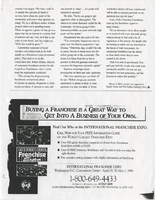Search the Special Collections and Archives Portal
Search Results
Stephen Nasser Papers
Identifier
Abstract
The Stephen Nasser Papers (1992-2018) mainly contain letters written from school children to Nasser who travels to schools, churches, and organizations around Las Vegas, Nevada to share his story of surviving the Holocaust during World War II. Materials in this collection document his captivity in various prison camps and includes photographs, awards, and newspaper clippings. Also included are speeches given by Nasser and book reviews and a teacher's guide of his book My Brother's Voice written by students of Dixie College, St. George, Utah. This collection includes a copy of
Archival Collection
North Las Vegas Chamber of Commerce Records
Identifier
Abstract
The North Las Vegas Chamber of Commerce Records documents the activities of the North Las Vegas Chamber of Commerce in southern Nevada from approximately 1970 to 2007. The majority of this collection is comprised of photographs and scrapbooks documenting North Las Vegas Chamber of Commerce member events. The collection also includes business guides, event invitations, and issues of the organization’s monthly newsletters,
Archival Collection
River Mountains Trail Partnership Records
Identifier
Abstract
The River Mountains Trail Partnership Records date from 1995 to 2015 and document the planning and construction of the River Mountains Loop Trail in Clark County, Nevada. The collection contains meeting agendas and minutes, correspondence, project notes, trail maps, land surveys, grant applications, photographic slides of the trail and Lake Mead, environmental assessments, ephemera from National Trails Day, trail guides, interpretive plans, and development reports.
Archival Collection
Karl Carsony Papers
Identifier
Abstract
The Karl Carsony Papers (1918-2011) are comprised of photographs, newspaper clippings, ephemera, and artifacts representing Karl (Schrom) Carsony's acrobatic career and personal life. The bulk of the materials in this collection date from approximately the early 1950s through the late 1970s. The materials also include vacation photographs of Karl (Schrom) Carsony and his wife, Margot Meyers. The materials also include promotional photographs, posters, and fliers for the Carsony Brothers, which was an acrobatic show consisting of Karl Carsony and his twin brothers, Joe and Bert Schrom.
Archival Collection
Joe Williams Music Scores
Identifier
Abstract
The Joe Williams Music Scores date from 1940 to 1991 and comprise the handwritten musical scores of American jazz musician Joe Williams, born Joseph Goreed. Many of the musical scores are Williams' original arrangements.
Archival Collection
Jon E. Cobain Papers
Identifier
Abstract
The Jon E. Cobain Papers (1963-2009) contains material representing Cobain's experience as the first official graduate of Nevada Southern University (later University of Nevada, Las Vegas) in 1964. Materials include photographs of Cobain and his family, a scrapbook from his 1964 graduation day, newsletters, a copy of Beau's Bits Handbook, personal correspondence, and his diploma. This collection is comprised exclusively of digital surrogates.
Archival Collection
Thomas Schiff Panoramic Photographs
Identifier
Abstract
The Thomas R. Schiff Panoramic Photographs (2001-2009) are comprised of physical and digital panoramic photographs of hotel casinos and other locations around Las Vegas, Nevada used in his book,
Archival Collection
Aaron Williams Photograph Collection
Identifier
Abstract
The Aaron Williams Photograph Collection (approximately 1968 to 1983) consists of three black-and-white photographic prints. Two of the images are of the groundbreaking ceremony of the Senior Citizens’ Center with Las Vegas, Nevada Mayor Oran Gragson, and the third of three unidentified individuals.
Archival Collection
Julian Escutia-Rodriguez (Mexican Consulate of Las Vegas) oral history interview conducted by Magdalena Martinez and Elia Del Carmen Solano-Patricio: transcript
Date
Archival Collection
Description
From the Lincy Institute "Perspectives from the COVID-19 Pandemic" Oral History Project (MS-01178) -- Community organization interviews file.
Text

